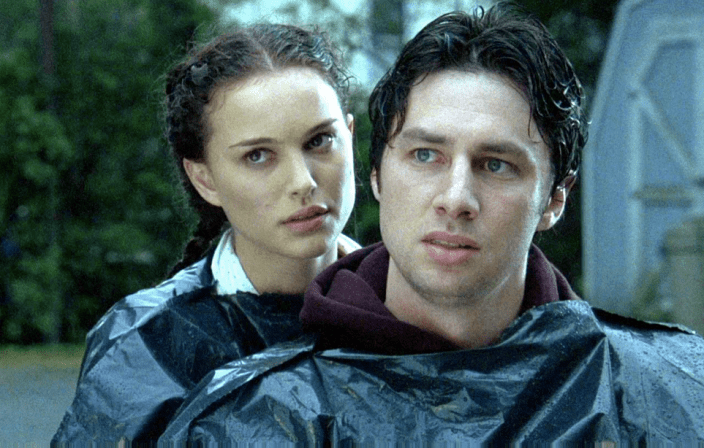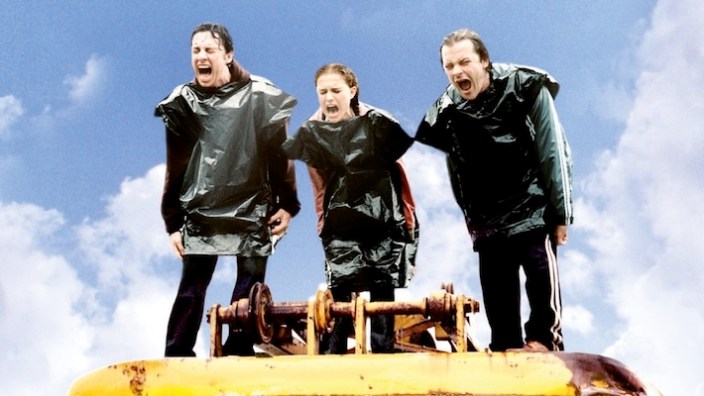
“You gotta hear this one song, it’ll change your life, I swear.”
The above line from Garden State, uttered by Natalie Portman’s character in writer/director/star Zach Braff‘s film captures a moment of highly relatable music discovery in its purest form as she passes her headphones to Braff’s character so he can experience The Shins for the first time. It also recalls an era of unapologetic earnestness and enthusiasm. Not 2004, the year the film came out, but when we were each in our more unguardedly romantic 20s.
How you feel about that 5, 10, or 15 years ago era from your own life may color how you feel about Garden State, a film that tells the story of a struggling young actor dealing with loss, numbness, loneliness, and the possibility of a life-saving love. As a result, it might also impact your affection for the landmark indie-infused soundtrack that goes from the opening chords of Coldplay’s “Don’t Panic,” to the dream state of Zero 7’s “In The Waiting Line,” the eye-opening “New Slang” of The Shins, and the gentle drive of Iron & Wine’s version of “Such Great Heights.”
Do you wince when thinking back to that few-years-ago version of yourself and the art that captivated and comforted you? Or do you grant the younger you some grace for how easily you could be consumed by a song, a relationship, or a moment?
The legacy of Garden State (which is front of mind following the soundtrack reunion concert at LA’s Greek Theater last weekend — more on that in a second) will likely forever linger at the intersection of that question, creating a kind of split between those who have deep unending affection for it and those who relish rolling their eyes at its mention.
The film holds critic and audience scores on Rotten Tomatoes in the mid-’80s and the soundtrack won a Grammy and routinely places high on lists of the best soundtracks of all time. But there have also been some critics who have written Garden State off as a “manic pixie dream girl” fantasy, as twee, privileged, or worse.
Why am I bringing this up atop an interview with Braff that’s focused on celebrating the legacy and community that has risen up around the film and its soundtrack? Well, I just have a small, long-held point to make about Garden State and the timelessness of art.
Before I get to that, though, I want to tell you some things Zach Braff said to us when we spoke about the film, the music, his emotional connection to it, and that epic soundtrack reunion concert featuring many of the album’s artists, a monumental indie music celebration that is about to be streamable via Veeps for $19.99 with all proceeds going to The Midnight Mission charity.
The brainchild of Braff and Cary Brothers (a longtime friend and collaborator of Braff’s whose song, “Blue Eyes,” is a part of the soundtrack), the concert is chock-full of surprises that you can unearth if you’re keen on spoiling things for yourself before watching what The Guardian called “Woodstock for elder millennials.”
It’s also a loving gift to the community of fans that sometimes get left out of the conversation about the film. People who routinely let Braff in on how his film and its soundtrack impacted their lives, including those who connected with their partners and friends over the film and some who have immortalized it via tattoo. (Let’s not contemplate the potential for irony if multiple people have tattoos of Natalie Portman’s character making a noise or doing something no one has ever done before to feel unique.)
Braff’s own relationship to the soundtrack is, as you can imagine, a bit of an emotional minefield. “You have to understand,” he says.”For me, it’s such an intense… it’s like nostalgia overload. My eyes will well. It was such a pivotal moment in my life and it was such a crazy time and I never really thought anyone was going to see this movie.”
While the soundtrack exists as a passport to an eclectic list of artists that also includes Nick Drake, Imogen Heap, and Frou Frou, it took a long while for Braff to absorb its impact on music culture. Even after winning that Grammy.
“I just thought, ‘Oh, people love it.’ I didn’t put it together until years later that this was exposing people who hadn’t been exposed to a new genre of music.” Don’t worry, just to be sure he didn’t forget about that impact, I also told him how the Garden State soundtrack activated my music tastes.
Like the film, which came from Braff’s own experiences with a “quarter-life crisis” and feelings of being adrift while searching for love and purpose, the soundtrack is informed by his own life and experiences, giving the collection its much-remarked-upon mixtape vibe.
“We were going to local music venues (Largo, The Viper Room) and seeing great cool bands and we were sharing music and we just kind of talked about music and we shared songs, mixtapes,” says Braff.
While Garden State is the album and film Braff will be forever most tied to, he has gone on as a filmmaker, melding music and story to great effect (particularly with 2006’s Last Kiss, a film with an under-remembered soundtrack that feels like a pseudo-sequel to the Garden State album featuring many of the same artists as well as Aimee Mann and Rufus Wainwright). However, that initial success has certainly added an element of pressure.
“I felt like I was sort of disappointing the fans if I didn’t bring it as best as I could with the movie(s). I felt, especially the stuff that’s my own personal stuff, A Good Person, Wish I Was Here, Last Kiss, I felt like part of the audience’s experience of the film is going to be the music,” he says. However, that might not continue forever. “I probably need to break out of that and not have that, maybe my next film I won’t put that much pressure on myself about it. But I certainly feel you want to give the fans the experience that they’re expecting, and I definitely have felt that they want good music.”

Good music endures, of course. Passed on from era to era if we let it, either directly or in how it inspires the next thing. That potential is clear when a 20+-year-old soundtrack can generate a quickly sold-out reunion concert, loads of buzz, and likely thousands and thousands of streams (and untold dollars for a good cause). But forgetting the age and other dividers in front of Garden State (such as reviews that reach beyond reasoned criticism into the land of snarky overhate) is kind of what I’m advocating here because movies and music do not age, only audiences and critics do.
Though Garden State was made in a moment for people in a specific time and place, that moment and those people will move along, but that time and place will get occupied by other people.
25 year olds are still wrestling with things in 2025 that people had to endure in 2005, 1995, and so on (in addition to a L-O-T of other shit that doesn’t need to be gotten into here, of course).
The songs on the soundtrack, which have collectively influenced indie music over that same span, are also right there, ripe for discovery and re-discovery. All you need to do is accept the notion that common threads exist and that an openness to art as something without an expiration date opens up a world of new sounds and stories.
When I ask Braff, near the end of the conversation, whether Garden State can resonate with people in their 20s now, he says, “Not a day goes by that someone doesn’t tell me how much this film meant to them. Oftentimes these days it’s our age people sharing it with their kids or young people who are in a similar (place) or going through a similar experience. I think your early twenties are very daunting and I think that a lot of people then and now can tap into that.”
If you’re a fan, enjoy the nostalgia. If you’re unfamiliar, maybe stream a great concert before checking into a film that might connect with you, something that is a pretty life-changing experience, if you ask me.
The ‘Garden State 20th Anniversery Concert’ is available to stream on Veeps Saturday April 6.


 7725
7725